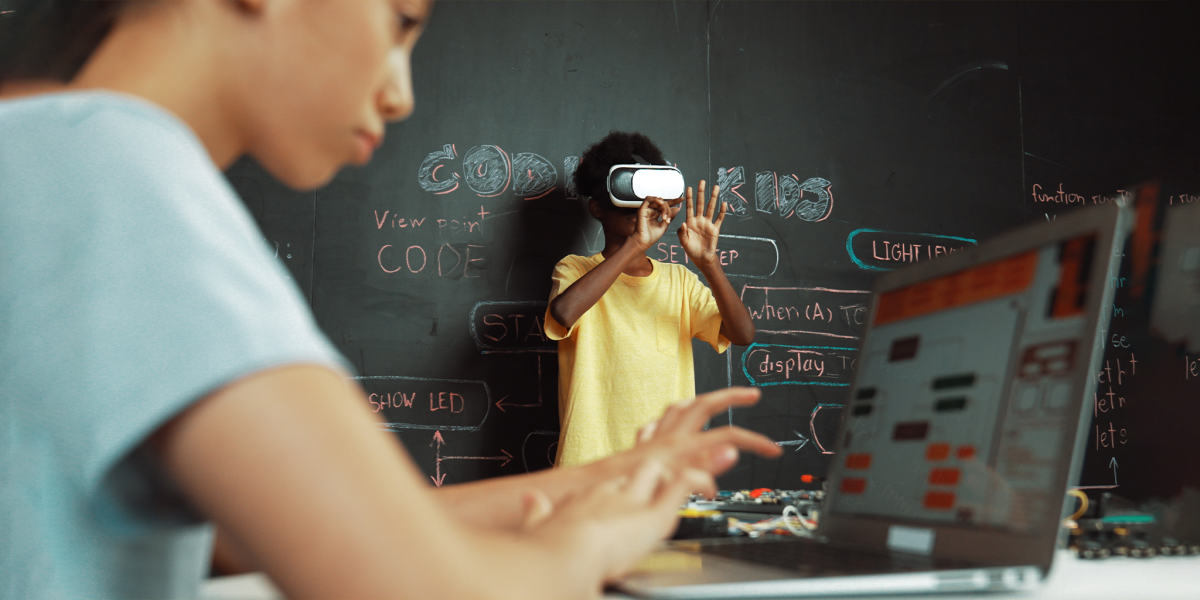A unique partnership is closing the digital divide by creating community-led AI literacy programs for underserved youth and families

Photo licensed by Adobe Stock via InfiniteFlow
It began with a hesitant girl, learning to code on her laptop during the height of the pandemic. She started off slow, unsure of her abilities. But then, something clicked. She began devouring the material, taking on new projects, and her confidence soared. Ron Nicholson, executive director of the STEM education nonprofit BCAUSEICAN, helped her grow. Years later, at an event on the University of Maryland (UMD) campus, that same girl approached him. “Mr. Ron, you taught me coding in the sixth grade,” she said. When he asked what she was doing now, her answer was a powerful testament to BCAUSEICAN’s impact: “I’m leading the engineering program at my high school.”
This story is the DNA of BCAUSEICAN, an organization built on exposing youth in resource-constrained communities to technology and fostering a belief: “Yes, I can.” Now, that proven model is being applied to one of the most urgent and pervasive technologies—artificial intelligence (AI)—through a partnership with UMD.
BCAUSEICAN is working with UMD researchers and other nonprofits on a new initiative to build community-driven AI literacy. They are collaboratively designing a summer program focusing on AI for middle schoolers in resource-constrained communities. The project is funded by a grant from TRAILS (Trustworthy AI in Law and Society), a National Science Foundation AI Institute. It is led by Sheena Erete, associate professor at the UMD College of Information and associate director of research for the Artificial Intelligence Interdisciplinary Institute at Maryland (AIM), INFO postdoctoral researcher Hawra Rabaan, INFO Professor Tamara Clegg, and Afiya Fredericks, associate professor at Morgan State University. The initiative is a direct expansion of a successful pilot called “Tech on the Block,” which the team ran in the summer of 2024.
The project is fundamentally reimagining how communities engage with technology. The project partners aim to build students’ and parents’ critical literacy about AI so that they can understand the strengths and limitations of the tools. They will also work directly with parents to encourage their own confidence in learning about the tools and help them understand how they can support their children’s exploration of the technology.
“Parents are the first educators in a child’s life,” says Erete. “If we can build their confidence alongside their children’s, we’re not just creating a single program—we’re strengthening a community’s long-term relationship with each other and with technology.”
A Coalition Built on Trust
Each partner has a distinct role. The university researchers provide the AI expertise and research framework for designing inclusive STEM out-of-school programs. The researchers will work with the community partners to conduct interviews and co-design workshops with program providers and parents to update the AI curriculum. Metamorphosis, a faith-oriented organization deeply embedded in Prince George’s County, will help recruit for the interviews and workshops and provide input on the interview questions and workshop activities as well as hire mentors. BCAUSEICAN will run the youth program in their existing model for creating summer opportunities for youth and their families. This model is crucial for building trust and ensuring the program meets the community’s needs and is sustainable beyond the grant.
For Nicholson, this co-design approach is key to building confidence across generations. “I feel it is unique in that the youth and parents have the opportunity to learn the technology together,” he says. “I think it will aid parents as advocates for their students in technology in ways that haven’t existed for them before this program.”
“We have to partner with as many people as possible to help our community make their ultimate goal a reality,” says Pastor Mike Dickson of Metamorphosis. He sees this as a critical moment to ensure marginalized communities help shape AI, rather than just being subject to it. “I see AI right now as the least complex and least intimidating that it will be. So moving forward, if we don’t seize the opportunity now, then the opportunity will pass us by.”
Defining Success
The project directly addresses the skepticism and fear that often surrounds AI in communities that have historically been harmed by new technologies. Dickson notes that during recruitment for the Tech on the Block pilot, some parents were deeply wary, with concerns ranging from privacy to questioning, “Are you trying to program our kids?” This skepticism was heightened because enrolling in the summer program involved participating in research, which involves classroom observations and interviews, which some parents were uncomfortable with.
“Trust isn’t something we can assume—it’s earned through relationships and shared decision-making,” Erete explains. “When communities help shape how AI is introduced and taught by those who are trustworthy and credible to them, it becomes something they own rather than something imposed on them. When they are a part of the research in a meaningful way, they begin to demonstrate trust.”
The ultimate goal is to create a program that the community adopts as a necessity. BCAUSEICAN will be the engine of this sustainability. In the summer of 2026, they will integrate the finalized AI curriculum into their own summer programming, taking full ownership from the university.
For Nicholson, the measure of success is profound yet simple. “The one thing I hope for any student leaving our program at any age is the sense of empowerment,” he says. It’s the same empowerment that turned a hesitant sixth grader into a high school engineering leader, proving that with the right exposure and support, the next generation can not only understand technology but also lead it.
- Faculty & Staff
- INFO News
- Partner & Industry News
- Research News
- Accessibility and Inclusive Design
- Future of Work
- Human-Computer Interaction
- Information Justice, Human Rights, and Technology Ethics
- Machine Learning, AI, Computational Linguistics, and Information Retrieval
- Youth Experience, Learning, and Digital Practices